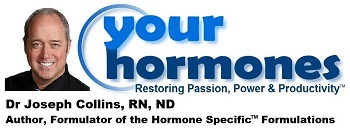
Answer: Premenopause means before menopause. This term may actually be used to describe women in their twenties to their early fifties. Perimenopause literally means "around menopause" - and likewise draws our attention to the changes that may take place around the time of true menopause. Menopause has taken place after there has been 12 consecutive months without a period (not due to pregnancy or breast feeding). The 12 months indicates the the permanent cessation of the regular monthly cycle, and may be associated with various changes in hormone levels.
Preparing for an ensuing menopause requires attention to the fact that choices made years before menopause will determine both the ease of the course, and the type of menopause a woman will eventually experience. Chapter 15 of "Discover Your Menopause Type" is titled “Conclusion, The Future of Menopause: How to Prepare”. And while I will touch on most of those points in this answer, I will also share some new insights we have learned since the book was published. Here are things that woman can (should) do before menopause. The sooner the better.
Eat a healthy diet now. A healthy diet - free from the extremes of severe dieting and binge eating - can increase the opportunity for an ideal menopause. Diets rich in whole fruits, vegetables, grain and legumes can provide the wide range of phytoestrogens that make the transition smoother (pg. 212). Whole foods – especially fruits and vegetables, are naturally rich in antioxidants. Women who use alcohol should make sure that alcohol is really used in great moderation. Excessive alcohol use can bring about an earlier and more uncomfortable menopause.
Start nutrition supplements now. A personalized nutritional support plan should definitely be part of any program aimed at achieving the ideal menopause (Menopause Type 1). Over two-dozen vitamins and minerals are required for the production of the sex hormones (see Chapter 12). These vitamins and minerals are best acquired by using multiple vitamin & mineral supplements. But supplements will not provide everything a woman needs to achieve an ideal menopause; a healthy diet is a must – and in most women do best when they also take an essential fatty acid supplement that is rich in DHA & EPA. Study the Hormone Health Guidelines to learn more about achieving complete hormone health.
Learn stress management now. Stress management can come in various forms or techniques. Activities such as relaxation exercises, meditation, prayer, yoga, exercise and play, all can help diminish the degree to which stress can impact onset and severity of menopause. This often comes down to adding healthy recreation back into your life. Make life choices that allow time for relaxation and proper management of stress as early as possible in life. It is always easier to keep healthy habits started before menopause than it is to start them after menopause has already started. Exercise in and of itself can bring about a more favorable perimenopause and menopause.
It's interesting to note that moderate exercise will actually increase sex hormone production. But avoid extremes. Excessive exercise has been shown to decrease sex hormones in a number of studies. As well as exercise, include relaxation as part of a healthy life style. And remember that inadequate sleep can also lower hormones (page 314). Begin regular physical activity now. It will be more difficult to start an exercise program if fatigue comes on with menopause. Regular exercise will actually decrease the chances of having fatigue during menopause.
Eliminate fatigue now. If a premenopausal woman of any age is already experiencing fatigue or decreased ability to tolerate stress, it is best to address it before menopause. Too often I have heard women say, that they “expected the fatigue to go away” after the children move out; or after their next promotion; after they quit doing overtime to pay off debts; or after any multitude of demands that they expect to become less demanding. Unfortunately, there are always new demands, and new opportunities that never quite allow us to really have some down time. Now is the time to eliminate fatigue. When a woman goes through menopause her adrenal gland have to take on some additional responsibly for keeping your hormone levels healthy. The ovaries are providing less hormones, so the adrenal gland are recruited to make up for the dropping levels. Ideally, adrenal recruitment results in increased production of hormone levels from the adrenal gland after menopause.
Since adrenal recruitment is required for ideal menopause to occur, the health of the adrenal glands needs to become a greater focus in women's health. Stress - no matter what kind, or where it comes from - can have adverse effects on the normal production of hormones. Consider this; under increased stress the body will make more cortisol so that the body can tolerate the stress. The hormone-making pathway (steroidogenic pathway) that makes this needed boost in cortisol is the same pathway that makes the "sex hormones" (estrogens, progesterone and testosterone). Under stress there will be increased cortisol at the expense of the sex hormones. In addition to diet, supplements and stress management, the most effective way ot overcome fatigue is through proper use of adaptogens – herbs that help the body adapt to stress.
The plant adaptogens in AdrenoMend™ effectively address all stages of both acute and chronic stress, support the bodys ability to adapt to stressors and help avoid the damaging consequences from those stressors. Collectively, plant adaptogens can support symptoms of fatigue and enhance endurance as well as support normal mental and emotional well being. consider using adaptogens to strengthen the adrenal glands.
Alleviate PMS/PMDD now. If a premenopausal woman of any age is experiencing PMS, she should seek out a healthcare professionals to assist her in achieving balance and relief as soon as possible. Treating the symptoms of PMS does not restore balance. Women who experience premenopausal PMS often experience a more difficult and unbalanced menopause.
Decreased use, or avoidance, of caffeine may be of additional help in attaining an ideal menopause. Avoiding caffeine has been associated with decreased hot flushes, and caffeine will cause the same reaction as stress - increased cortisol.
Do not smoke or use tobacco. Use of tobacco products, can bring about an earlier and more uncomfortable menopause.
Learn about medications you use. Medications that can lower hormone production may also bring about an earlier and non-ideal menopause (review the lists of these drugs in Chapter 10). Ask you prescriber if there are options that do not affect hormones, or work with an integrative health care professional that may help you eliminate the need for some medications.
Check your thyroid. Women are more likely to have thyroid disorders than men. Have your thyroid checked regularly. And ask that your actual thyroid hormones (T3 & T4) be measured, as well as antibodies (anti-TPO & anti-TG) that may insidiously attack the thyroid. Measuring only TSH is not enough.
Begin now. Improving lifestyle and eating choices is a good idea any time. Undertaking such major changes as a better diet, starting to exercise, taking new supplements, making time for recreation, quitting smoking and decreasing alcohol intake take significant effort. As noted, trying to start these changes while having to deal with menopause symptoms proves to be all the more difficult. So start making healthy choices now.
It's important to realize that the choices listed above each have the ability to decrease symptoms, and reverse health risks, in women who have already entered menopause. Making these choices years, or decades, before the onset of menopause can provide a greater opportunity of attaining the ideal menopause. Consider consulting with an integrative healthcare professional who can help you utilize the Hormone Health Guidelines.
Dr. Joseph J. Collins, RN, ND
